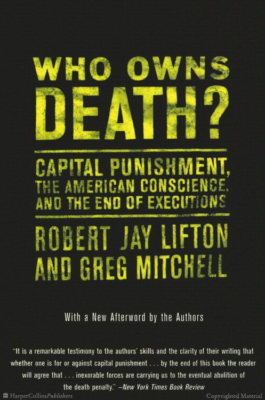
Who Owns Death? by Robert J. Lifton and Greg Mitchell
Well, I knew going in this wasn’t going to be the lightest of reads, but jeez…
Who Owns Death? is an investigation into capital punishment in America. It takes a look at the history, the laws, the felons, the victims, the executioners and the possibility of its future within the law system.
Death was once an accepted form of punishment held around the globe. It was morbid entertainment for some and a simple way to rid the penal system of the worst criminal offenders. These days most countries have done away with this practice (the last execution in the UK was in 1964, which to me doesn’t seem like that long ago) yet America continues to hang on to this tradition – pardon the pun.
I think what struck me most about this book was the fact that there has never been a period in time in which capital punishment was seen as a stable, reliable form of punishment. It has never been proven to deter criminal activity and even hundreds of years ago, when it was at the height of its popularity with the public, its necessity was continually questioned.
When it comes to this subject matter in particular, America appears nothing short of barbaric. Religion still has a tight hold over the country, which is one of the main reasons executions are still taking place in some states. Using an archaic form of punishment in the modern world just doesn’t seem to be working – with modern technology and today’s complex laws, rather than a killer simply being killed after their trial, there are decades of appeals before the execution is even considered.
There have been attempts to modernise capital punishment in some ways, particularly with the search for a more ‘humane’ form of death. The injection is now favoured, but there have been many, many cases of it going terribly wrong. There are also countless stories of electrocution, hanging and gassing cases ending in violent and painful deaths. Oddly, these incidents have not deterred the search for a ‘humane’ way to execute prisoners, and when questioned about it officials often state that a painful death is justice for the crimes committed. So what do they want? To kill people or to put them to sleep?
It’s a very confusing subject matter, for the insider as well as the outsider. Some Americans want capital punishment to stay but want it to be more humane. Others want it completely abolished. Some think criminals should be lynched and tortured in the most painful of ways (capital punishment had to be reintroduced to one southern state as the inhabitants began lynching the criminals who weren’t executed).
Much like the controversial gun laws, capital punishment has remained in America because it has been embedded in layers of political, social and religious scandal. There is a very simple solution, but the country is too vast and too fractured for the government to end it now – that’s if they even want to end it, of course.
This book was nothing short of horrendous to read, but I feel it’s a very important glimpse at the human psyche. We are a contradictory, brutal and complicated species; we are imperfect, but are desperately trying to be perfect. We try to see things as good and evil, black and white, but that’s not how we function.
At the end of the day death does not kill crime, it just creates more killers.



Leave a Reply